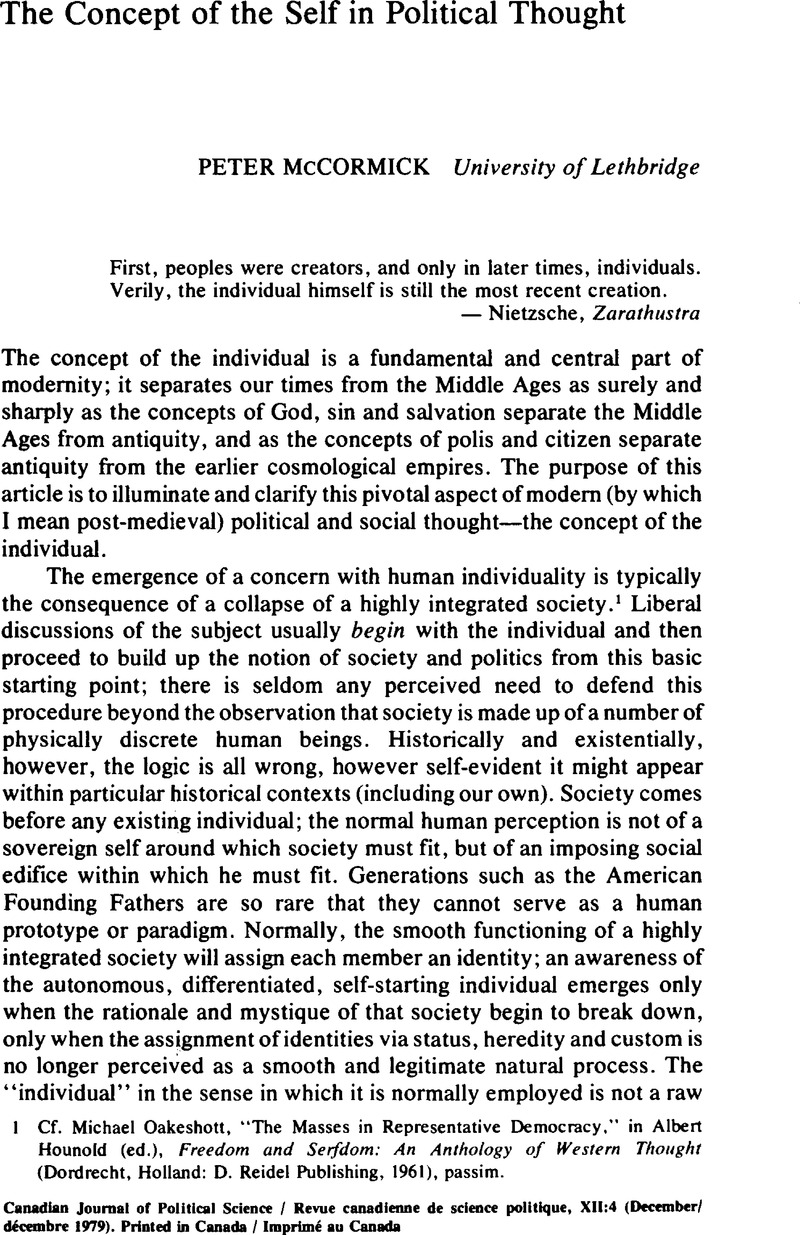Published online by Cambridge University Press: 10 November 2009

1 Cf. Oakeshott, Michael, “The Masses in Representative Democracy.” in Hounold, Albert (ed.), Freedom and Serfdom: An Anthology of Western Thought (Dordrecht, Holland: D. Reidel Publishing, 1961)Google Scholar, passim.
2 Cf. Numa Denis Fustel De Coulanges, The Ancient City: A Study on the Religions, Laws and Institutions of Greece and Rome (Garden City: Double/Anchor, n.d.), passim.
3 Cf. Arendt, Hannah, The Human Condition: A Study of the Central Dilemmas Facing Modern Man (Garden City: Doubleday/Anchor, 1959), Pts. 1Google Scholar and 2, passim.
4 Aristotle, Politics, Bk. 1.
5 Cf., for example, Gouldner, Alvin W., The Hellenic World: A Sociological Analysis (New York: Harper Torchbooks, 1969)Google Scholar, chap. 2; and Rosenthal, B. G., The Images of Man (New York: Basic Books, 1971), Pt. 2Google Scholar.
6 Cf. especially Adkins, A. W. H., Merit and Responsibility: A Study in Greek Values (Chicago: University of Chicago Press/Midway Reprint, 1975)Google Scholar.
7 Dunne, John, The City of the Gods: A Study in Myth and Mortality (New York: Macmillan, 1965)Google Scholar.
8 The reference is to Adkins, A. W. H., From the Many to the One (Ithaca: Cornell University Press, 1970), passimGoogle Scholar.
9 Jonas, Hans, The Gnostic Religion: The Message of the Alien God and the Beginnings of Christianity (2nd ed.; Boston: Beacon Press, 1963), 248Google Scholar.
10 Plato, The Apology of Socrates (Library of Liberal Arts, Bobbs-Merrill edition), 38.
11 Plato, Republic, Bk. 2, 45–53.
12 Gunnell, John G., Political Philosophy and Time (Middletown: Wesleyan University Press, 1968), 124Google Scholar.
13 Cf., for example, Jonas, The Gnostic Religion, 23ff.
14 Ibid.
15 Cf., for example, Voegelin, Eric, Science, Politics and Gnosticism: Two Essays (Chicago: Henry Regnery/Gateway, 1968)Google Scholar; and Voegelin, Eric, The New Science of Politics: An Introduction (Chicago: University of Chicago Press, 1952)Google Scholar, passim.
16 Fora discussion of the concept of primeval time and its political implications, see, for example, Gunnell, John, Political Philosophy and Time (Middletown: Wesleyan University Press, 1968)Google Scholar.
17 Rosenthal, Images of Man, Pt. 2, passim.
18 Oakeshott, “The Masses in Representative Democracy,” 152.
19 Ibid., 154.
20 Berman, Marshall, The Politics of Authenticity: Radical Individualism and the Emergence of Modern Society (New York: Atheneum, 1972), 79Google Scholar.
21 These brief remarks on social contact are based on the expanded argument in my “Social Contract: Interpretation and Misinterpretation,” in this Journal 9 (1976), 63–76Google Scholar.
22 John Stuart Mill, Utilitarianism, chap. 1, 7–10, in Everyman Library edition.
23 John Stuart Mill, On Liberty, chap. 1, 74, in Everyman Library edition.
24 Cf. Letwin, Shirley R., The Pursuit of Certainty (Cambridge: Cambridge University Press, 1965), 141Google Scholar.
25 Cf. Berman, Politics of Authenticity.
26 Cf. McManners, John, The Social Contract and Rousseau's Revolt Against Society: An Inaugural Lecture (Leicester: Leicester University Press, 1968), 14Google Scholar.
27 J.-J. Rousseau, Rousseau Juge de Jean-Jacques, Premier Dialogue, passim.
28 Stirner, Max, The Ego and His Own, selected and introduced by Carroll, John (New York: Harper Torchbooks, 1971), 187Google Scholar.
29 Ibid., 227.
30 Friedrich Nietzsche, Will to Power, Pt. 4, No. 958.
31 Ibid., No. 900.
32 Cf. Kaufman's footnote in Nietzsche, Genealogy of Morals, 41.
33 Nietzsche, Thus Spoke Zarathustra, Pt. 1, “Zarathustra's Prologue.”
34 Nietzsche, Will to Power, Pt. 4, No. 940.
35 Nietzsche, Thus Spoke Zarathustra, Pt. 1, “On the Way of the Creator.”
36 Ibid., “On the New Ideal.”
37 Derathe, Robert, “L'Homme selon Rousseau,” in Etudes sur le Contrat Social de Jean-Jacques Rousseau: Eludes des journées d'étude organisées à Dijon, 1962 (Dijon: Publication de l'Université de Dijon, 1964), 61Google Scholar; cf. Charvet, John, The Social Problem in the Philosophy of Rousseau (Cambridge: Cambridge University Press, 1974)Google Scholar.
38 Cf. Plamenatz, John, “On le Forcera d'Etre Libre,” in Cranston, Maurice and Peters, R. S. (eds.), Hobbes and Rousseau: A Collection of Critical Essays (Garden City, Doubleday/Anchor, 1972), passimGoogle Scholar.
39 J.-J. Rousseau, Du Contract Social, Bk. 4, chaps. 1 and 2.
40 Cf. Plant, Raymond, Hegel (London: George Allen and Unwin, 1973)Google Scholar; Marcuse, Herbert, Reason and Revolution: Hegel and the Rise of Social Theory (Boston: Beacon, 1954), Pt. 1Google Scholar; Kaufman, Walter, Hegel: A Reinterpretation (Garden City: Doubleday/Anchor, 1965)Google Scholar; Avineri, Shlomo, Hegel and the Modem State (Cambridge: Cambridge University Press, 1972)CrossRefGoogle Scholar.
41 Cf. Zeitlin, Irving M., Marxism: A Re-examination (New York: Van Nostrand Reinhold, 1967)Google Scholar; Schaaf, Adam, Marxism and the Human Individual (New York: McGraw-Hill, 1970)Google Scholar; Avineri, Shlomo, The Social and Political Thought of Karl Marx (Cambridge: Cambridge University Press, 1968)CrossRefGoogle Scholar; Harrington, Michael, The Twilight of Capitalism (New York: Simon and Schuster, 1976)CrossRefGoogle Scholar.
42 Cf. especially Oilman, Bertell, Alienation: Marx's Conception of Man in Capitalist Society (Cambridge: Cambridge University Press, 1971)Google Scholar.
43 Bentley, Eric, The Cult of the Superman: A Study of the Idea of Heroism in Carlyle and Nietzsche (Gloucester: Peter Smith, 1969)Google Scholar.
44 Gregor, James, The Fascist Persuasion in Radical Politics (Princeton: Princeton University Press, 1974), 195Google Scholar.
45 Nagy-Talavera, Nicholas M., The Green Shirts and the Others: A History of Fascism in Hungary and Romania (Stanford: Hoover Institution Press, 1970), 114ffGoogle Scholar.
46 Ibid., 265ff.
47 Payne, Stanley G., Falange: A History of Spanish Fascism (Stanford: Stanford University Press, 1961), 25Google Scholar.
48 Cf. Stern, Fritz, “Introduction,” The Politics of Cultural Despair: A Study in the Rise of the Germanic Ideology (Garden City: Doubleday/Anchor, 1961)Google Scholar.